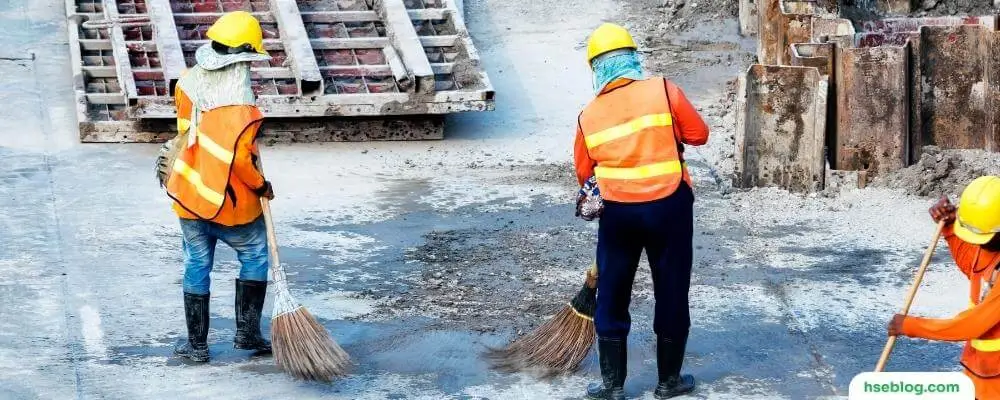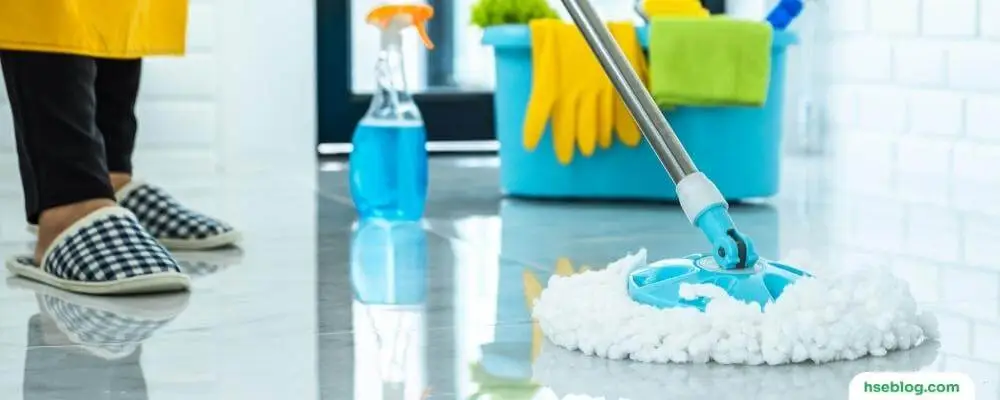Maintaining a clean and organized workplace is essential for productivity, safety, and overall employee well-being. A well-implemented housekeeping program not only enhances the visual appeal of a workplace but also plays a significant role in preventing accidents, improving efficiency, and fostering a positive work environment.
In this blog, we present 16 valuable tips for effective workplace housekeeping. These tips cover many areas, including preventing slips, trips, and falls, controlling dust, eliminating fire hazards, and much more. By implementing these tips, employers can create a clean and safe work environment that promotes employee health, productivity, and satisfaction.
From practical measures to preventive strategies, these tips offer actionable advice that can be tailored to fit various industries and workplaces. Whether you’re an employer, supervisor, or employee, incorporating these practices into your daily routines and operations will have a lasting impact on your workplace’s cleanliness, organization, and overall success.
So, let’s dive into the 16 tips and discover effective strategies to enhance workplace housekeeping, promote safety, and create a conducive environment for everyone involved.
What is Housekeeping?
Housekeeping refers to the maintenance, cleanliness, and organization of a physical space, such as a workplace, home, hotel, or other facility. It involves a range of activities and practices aimed at creating and maintaining a clean, safe, and orderly environment.
In the context of a workplace, housekeeping encompasses various tasks, including cleaning surfaces, floors, and equipment, disposing of waste properly, organizing tools and materials, and ensuring compliance with health and safety regulations. Effective housekeeping practices contribute to a pleasant and productive work environment, minimize the risk of accidents or injuries, and promote overall well-being.
Housekeeping involves not only the physical cleaning and tidying of spaces but also the implementation of systems, protocols, and procedures to sustain cleanliness and organization over time. It requires ongoing attention, regular maintenance, and the active participation of employees or occupants to achieve the desired results.
Ultimately, housekeeping plays a crucial role in enhancing productivity, safety, and overall quality of life by creating a clean and well-maintained environment where people can thrive and focus on their tasks effectively.
Tips For Effective Workplace Housekeeping
Maintaining a clean and organized workplace is essential for productivity, safety, and well-being. Here are some tips for effective workplace housekeeping:
1. Prevent Slips, Trips, and Falls in the Workplace
Slips, trips, and falls are a major cause of nonfatal occupational injuries, leading to lost workdays and reduced productivity. Ensuring your workplace is clean, orderly, and safe minimises these incidents.
Compliance with OSHA’s Walking-Working Surfaces Standard (1910.22(a)) is crucial. This means maintaining clean and dry floors, providing proper drainage for wet processes, and tidying passageways, storerooms, and service rooms.
- Select the right flooring: Choose appropriate flooring material, such as cement or ceramic tile, based on the specific needs of your workplace. Different flooring materials offer varying levels of durability and resistance to wear and tear.
- Develop and implement effective housekeeping procedures: Use suitable cleaning agents and protocols to remove potential slip hazards like oil and grease. Incorrect cleaning methods can spread contaminants instead of removing them, exacerbating the risk of slips.
- Promptly report and clean up spills and leaks: Encourage employees to report spills immediately and clean them up as soon as possible to prevent accidents.
- Keep aisles and exits unobstructed: Ensure that walkways and emergency exits are free of clutter and obstacles to facilitate easy movement and swift evacuation in emergencies.
- Install mirrors and warning signs: Use these tools to improve visibility in blind spots and around corners, helping to prevent collisions and accidents.
- Replace or repair damaged flooring: Regularly inspect flooring for signs of wear, rips, or damage, and promptly address any issues.
- Consider anti-slip flooring: In areas prone to wetness or spills that can’t always be cleaned, install anti-slip flooring to reduce the risk of slips and falls.
- Use drip pans and guards: These tools can help to contain leaks and spills, keeping floors clean and safe.
- Appropriate standing surfaces: Mats, platforms, and false floors can offer dry and comfortable standing places for employees, reducing the risk of slips and falls.
- Ensure a hazard-free environment: Remove potential hazards, such as protruding nails, splinters, holes, and loose boards, from the workplace.
- Conduct regular audits and encourage employee focus: Regularly inspect the workplace for trip hazards and encourage employees to stay focused on their tasks and be aware of their surroundings.
By implementing these strategies, employers can create a safer work environment and significantly reduce the risk of slips, trips, and falls.

2. Eliminate Fire Hazards
Preventing fire hazards is a collective responsibility, with employees playing a crucial role in maintaining a safe work environment. Ensuring proper storage and disposal of combustible materials and adhering to fire safety measures can significantly reduce the risk of fire incidents in the workplace.
Follow these precautionary measures for fire safety:
- Limit combustible materials: Keep only the necessary amount in the work area. Remove any excess materials and store them in a designated safe storage area.
- Store flammable materials properly: Keep quick-burning, flammable materials in assigned locations, away from ignition sources, to reduce the fire risk.
- Minimize contamination risk: Avoid getting flammable liquids on clothing. If contamination occurs, change clothes immediately to reduce the risk of ignition.
- Keep passageways and fire doors clear: Ensure all passageways, stairwells, and fire doors are free from obstructions. Stairwell doors should be closed, and items should not be stored in stairwells.
- Maintain safe distances from fire protection equipment: Store materials 18 inches away from automatic sprinklers, fire extinguishers, and sprinkler controls. While an 18-inch clearance is mandatory, a 24 to 36-inch clearance is recommended. For piled materials, maintain a 3-foot clearance from the ceiling. If materials are piled more than 15 feet high, double the clearance. Always check and follow applicable codes, such as the Life Safety Code, ANSI/NFPA 101-2009.
- Report and address electrical hazards: Identify any hazards in electrical areas, report them immediately, and issue work orders to have them fixed as soon as possible.
By adhering to these fire safety measures, employees can help create a safer work environment, significantly reducing the risk of fire incidents and potential injuries.
3. Thoroughly Manage and Control Dust in the Workplace
Excessive dust accumulation can pose significant explosion hazards and affect the work environment’s air quality and overall safety. Proper dust management is essential for maintaining a safe and healthy workplace.
Follow these guidelines to effectively control dust:
- Identify dust accumulation risks: Be aware that dust accumulation of more than 1/32 of an inch (0.8 millimetres) covering at least 5 per cent of a room’s surface poses a significant explosion hazard. Regularly check for such accumulations.
- Consult an industrial hygienist: If air quality and dust are concerns in your workplace, engage an industrial hygienist to assess the situation and recommend appropriate measures.
- Adhere to NFPA 654 guidelines: This standard on preventing fire and dust explosions outlines steps for identifying hazard areas, controlling dust, and maintaining proper housekeeping practices.
- Utilize appropriate cleaning methods: Vacuuming is the preferred method of cleaning dust, as it removes dust without redistributing it. Sweeping and water wash-downs are alternative options, while “blow-downs” using compressed air or steam are permitted for inaccessible or unsafe surfaces.
- Use high-efficiency vacuum systems: Opt for wet methods or high-efficiency vacuum systems instead of regular shop vacuums or dry-sweeping methods. Compressed air should not be used, as it can redistribute dust throughout the workplace.
- Understand the impact of dust on equipment and products: Excessive dust can shorten equipment life and negatively affect product quality. Regular cleaning and maintenance of machinery are crucial to minimize these effects.
By implementing these measures, employers can effectively control dust accumulation, ensuring a safer and healthier work environment for all employees.
4. Prevent Material Tracking and Cross-Contamination
Preventing the spread of hazardous materials between work areas and outside the workplace is crucial for maintaining a safe and healthy work environment. Employers should implement measures to avoid tracking materials and prevent cross-contamination.
Follow these guidelines to minimize material tracking and cross-contamination:
- Maintain work-area mats: Regularly clean and maintain work-area mats, whether cloth or sticky-topped, to prevent the spread of hazardous materials to other areas or outside the workplace. Ensure mats do not pose tripping hazards.
- Implement separate cleaning protocols: Establish distinct cleaning procedures for different areas to avoid cross-contamination. For example, do not use the same mop to clean an oil spill or another area with different contaminants.
- Assess the need for industrial hygiene testing: If employees work with toxic materials, consider conducting industrial hygiene testing to ensure the workplace is safe and contamination-free.
- Provide uniforms and showering facilities: If employees handle toxic materials, provide uniforms and showering facilities to minimize the risk of contamination outside the workplace.
- Enforce a no-work-clothes-home policy: Employees working with toxic materials should not wear their work clothes home to prevent the spread of hazardous substances to their homes and families.
By adopting these measures, employers can effectively prevent material tracking and cross-contamination, ensuring a safer and healthier workplace for all employees.

5. Implement Measures to Prevent Falling Objects
Preventing falling objects is essential for maintaining a safe workplace, as such incidents can cause injuries to workers and damage to equipment. Employers should implement various precautions to minimize the risk of falling objects.
Follow these guidelines to effectively prevent falling objects:
- Install protective barriers: Use toe boards, rails, or nets to help prevent objects from falling and hitting workers or equipment.
- Stack materials safely: Stack boxes and materials vertically, without leaning or overloading, to reduce the risk of falling. Ensure that stacks are stable and secure.
- Store heavy objects on lower shelves: Place heavier items on lower shelves to minimize the potential for injury or damage if they fall.
- Keep equipment away from edges: Position equipment away from the edges of desks, tables, and other surfaces to prevent accidental falls.
- Avoid stacking objects in walking areas: Refrain from placing stacked objects in aisles or other areas where workers walk to minimize the risk of tripping or knocking them over.
- Be mindful of workplace layout: Design and organize the workplace to minimise workers’ exposure to hazards as they walk through different areas.
By implementing these measures, employers can effectively reduce the risk of falling objects, ensuring a safer and more secure workplace for all employees.
6. Maintain a Clutter-Free Workplace
A cluttered workplace affects productivity and increases the risk of ergonomic issues and potential injuries. Creating a clean and organized work environment is crucial for promoting safety and efficiency.
Follow these guidelines to effectively clear the clutter in the workplace:
- Maximize space and movement: A cluttered workspace restricts employees’ movement and can lead to ergonomic problems. Ensure employees have enough space to set up their workstations properly and move comfortably without twisting or straining their bodies.
- Return tools and materials to storage: Encourage employees to promptly return them to their designated storage areas after use. This prevents items from cluttering work surfaces and walkways.
- Dispose of unnecessary materials: Regularly assess the workplace for no longer needed materials and dispose of them appropriately. Clutter can accumulate when unused or obsolete items are left unattended.
- Keep aisles, stairways, and exits clear: Maintain clear paths by ensuring that aisles, stairways, emergency exits, electrical panels, and doors are free from clutter. This allows for safe and unobstructed movement throughout the workplace.
- Purge untidy areas: Identify areas prone to clutter, such as storage rooms or break areas, and implement regular decluttering practices. Empty trash receptacles before they overflow to maintain cleanliness.
By consistently promoting a clutter-free environment, employers can enhance workplace safety, improve workflow, and reduce the risk of accidents or injuries caused by disorganized spaces.
7. Implement Proper Storage Practices
Proper storage of materials is essential for maintaining a safe and organized workplace. By following appropriate storage practices, employers can prevent hazards, improve efficiency, and ensure compliance with relevant regulations.
Consider the following guidelines for storing materials properly:
- Adhere to OSHA regulations: Follow OSHA’s Materials Handling, Storage, Use, and Disposal Standard (1926.250), which prohibits the accumulation of materials that pose tripping, fire, explosion, or pest hazards in storage areas.
- Avoid blocking electrical panels: Do not store items, such as ladders or equipment, in areas that can block access to electrical panels. Blocked panels can create fire hazards and violate OSHA regulations.
- Store unused materials and equipment appropriately: Keep unused materials and equipment stored out of the way of workers to prevent clutter and hazards. Avoid using workspaces as storage areas to maintain an organized environment.
- Maintain designated storage spaces: Establish designated storage areas that are conveniently located and easily accessible to workers. Encourage employees to use these spaces to store tools and materials promptly after use.
- Establish a return-to-place policy: Emphasize the importance of returning tools and equipment to their designated storage locations. This practice ensures that everything is in its proper place and readily available when needed.
- Design storage spaces for usability: Create storage spaces that are ergonomically designed and user-friendly. Ensure that they are easily accessible, require minimal stretching or lifting, and are convenient to use. This encourages workers to utilize the designated storage areas effectively.
By implementing these storage practices, employers can enhance workplace safety, streamline operations, and promote a culture of organization and compliance.

8. Use And Inspect Personal Protective Equipment And Tools
Using appropriate personal protective equipment (PPE) and properly maintaining tools are crucial for workplace safety. Employers can minimize the risk of injuries and maintain a safe work environment by emphasising using and inspection PPE and tools.
Follow these guidelines for the use and inspection of PPE and tools:
- Determine appropriate PPE: Assess the potential risks associated with specific tasks and provide employees with the necessary PPE accordingly. Basic PPE, such as closed-toe shoes and safety glasses, should be worn during housekeeping activities. Consider other types of PPE, such as gloves, masks, or protective clothing, as per the specific hazards present in the workplace.
- Regularly inspect PPE: Conduct routine inspections of PPE to ensure its effectiveness and integrity. Check for any signs of damage or wear, such as tears, cracks, or broken parts. Replace or repair damaged PPE promptly to maintain its protective capabilities.
- Train employees on proper PPE use: Provide thorough training on proper use, fit, and maintenance of PPE. Ensure they understand when and how to wear each type of PPE and encourage compliance with safety protocols.
- Inspect, clean, and maintain tools: Regularly inspect tools to identify any signs of damage or malfunction. Clean tools regularly to remove dirt, debris, or other substances that may affect their performance. Repair or replace damaged tools promptly to prevent accidents or injuries.
- Remove damaged tools from the work area: Discard or remove any tools that are damaged beyond repair from the work area. Clearly label or tag them to indicate they are not safe for use.
Employers can protect their workers from potential hazards by promoting the proper use and inspection of PPE and tools, reducing the risk of injuries, and maintaining a safe working environment.
9. Determine the Appropriate Frequency of Housekeeping
Establishing the right frequency for housekeeping activities is crucial for maintaining a clean and safe workplace. The level of debris or contaminants present in the workplace can help determine the appropriate frequency of housekeeping tasks. Consider the following guidelines:
- Encourage active participation: All workers should actively participate in housekeeping efforts. Employees should tidy their work areas, promptly report safety hazards, and clean up spills when possible. Emphasize the shared responsibility of maintaining a clean and safe workplace.
- Regular inspections and clean-up at the end of shifts: Encourage workers to inspect and clean their workspaces before the end of each shift. This practice ensures that work areas are tidy and ready for the next shift, reducing the later cleaning time.
- Assess debris and contaminant levels: Evaluate the amount of debris or contaminants released in the workplace to determine the appropriate frequency of housekeeping tasks. This assessment can help determine the balance between regular, lighter cleaning activities, such as sweeping and responding to spills and more thorough deep cleaning.
- Develop a comprehensive housekeeping plan: Establish a housekeeping plan that includes a mix of routine cleaning tasks and periodic deep cleaning. Determine the frequency of each task based on the specific needs of the workplace and the level of debris or contaminants present.
- Encourage reporting of potential issues: Workers should be encouraged to report any housekeeping issues or areas that require attention. This proactive reporting helps address problems promptly and ensures a safer and cleaner work environment.
By considering the workplace’s specific conditions, implementing regular cleaning practices, and encouraging employee engagement, employers can maintain an effective housekeeping routine that aligns with the cleanliness needs of their workplace.
10. Establish Written Housekeeping Policies and Protocols
Creating written housekeeping policies and protocols ensures consistency and clarity in maintaining a clean and safe workplace. Written rules provide a formal and defined framework for housekeeping practices and can help prevent oversight or confusion. Consider the following guidelines:
- Document housekeeping policies: Put housekeeping policies in writing to formalize them. Clearly articulate the expectations, standards, and procedures for maintaining cleanliness and safety in the workplace.
- Specify cleaners, tools, and methods: Within the written policies, specify which cleaners, tools, and methods should be used for various cleaning tasks. This ensures consistency and provides clear guidance to employees.
- Define training requirements: Include the training requirements for housekeeping procedures in the written protocols. Ensure that employees know the proper procedures and receive appropriate training to carry them out effectively.
- Address specific cleaning needs: Tailor the written protocols to address the specific cleaning needs and workplace challenges. Consider the type of industry, materials used, and potential hazards when formulating the policies.
- Regularly review and update: Periodically review and update the written housekeeping policies to reflect any changes in procedures, equipment, or regulations. This ensures that the policies remain relevant and effective over time.
By documenting housekeeping policies and protocols, employers can establish clear expectations, provide consistent guidance, and enhance the effectiveness of their housekeeping efforts.

11. Maintain Long-Term Commitment to Housekeeping
Housekeeping should be viewed as an ongoing commitment rather than a one-time effort. Sustaining a clean and safe work environment requires continuous monitoring, auditing, and employee engagement. Consider the following guidelines for long-term housekeeping success:
- Maintain records: Keep records of housekeeping activities, inspections, and any issues or improvements. These records serve as a reference point for tracking progress and identifying areas that require further attention.
- Implement regular walkthrough inspections: Schedule regular walkthrough inspections to assess the cleanliness and safety of the workplace. These inspections should be conducted by trained individuals who can identify hazards, address deficiencies, and provide employee feedback.
- Report and address hazards: Encourage employees to report housekeeping hazards or issues. Promptly address reported hazards and take necessary actions to mitigate risks.
- Train employees: Provide comprehensive training on housekeeping practices, safety protocols, and maintaining a clean work environment. Continuously reinforce the training to ensure awareness and adherence to housekeeping standards.
- Set goals and expectations: Establish clear goals and expectations for housekeeping, such as cleanliness standards, response times for addressing spills or hazards, and overall workplace organization. Communicate these goals to employees and regularly assess progress towards achieving them.
- Conduct audits based on goals: Regularly audit housekeeping practices, procedures, and compliance based on the established goals and expectations. Use the audit results to identify areas for improvement and adjust housekeeping strategies as needed.
- Maintain persistence and dedication: Recognize that housekeeping issues are common but solvable. It takes persistence and dedication to consistently address housekeeping challenges and maintain a clean and safe workplace.
Employers can foster a culture of cleanliness, safety, and continuous improvement by adopting a long-term perspective and integrating housekeeping into daily operations.
12. Promote Employee Engagement and Ownership
Creating a culture of employee engagement and ownership is vital for effective workplace housekeeping. When employees feel a sense of ownership over their workspaces and actively participate in maintaining cleanliness, the overall cleanliness and organization of the workplace improve. Here’s a more detailed explanation of this tip:
- Encourage employee responsibility: Emphasize to employees that they are responsible for the cleanliness and organization of their workspaces. Encourage them to take pride in their surroundings and understand the impact of their actions on the overall work environment.
- Foster a culture of cleanliness: Create a work environment where cleanliness and organization are valued and emphasized. Communicate the importance of housekeeping practices and their positive effects on productivity, safety, and morale.
- Provide clear expectations: Clearly communicate housekeeping expectations to all employees. Define what a clean and organized workspace looks like, including guidelines for maintaining cleanliness, organizing tools and equipment, and reporting hazards or issues promptly.
- Recognize and reward: Implement a recognition and reward system to acknowledge and appreciate employees who consistently maintain a clean and safe work environment. This can be in the form of verbal recognition, small incentives, or public appreciation. Celebrate achievements and highlight examples of exceptional housekeeping practices.
- Foster open communication: Encourage employees to actively communicate housekeeping concerns, suggestions, or ideas. Create channels for employees to provide feedback and actively listen to their input. This fosters a sense of ownership and empowerment, as employees feel their voices are valued in improving workplace cleanliness.
- Provide resources and support: Equip employees with the necessary tools, cleaning supplies, and training to effectively perform housekeeping tasks. Ensure they have access to proper storage solutions, cleaning equipment, and personal protective equipment (PPE) to facilitate their engagement in maintaining a clean and safe work environment.
By promoting employee engagement and ownership, organizations can create a workplace culture that prioritizes cleanliness, enhances safety, and boosts overall employee satisfaction and productivity.
13. Provide Sufficient Storage Solutions for Effective Workplace Housekeeping
Having adequate storage solutions is essential for maintaining a clean, organized, safe work environment. Proper storage minimizes clutter, reduces the risk of accidents, and promotes efficiency. Here’s a more detailed explanation of this tip:
- Assess storage needs: Evaluate your workplace’s tools, equipment, and materials. Determine the quantity and types of storage solutions required based on the nature of your business operations.
- Utilize different storage options: Implement various storage options, such as cabinets, shelves, bins, racks, and drawers. Consider the size, weight, and frequency of use of the items to be stored when selecting the appropriate storage solutions.
- Label and designate storage areas: Clearly label and designate storage areas for different categories of items. Use visual cues, colour-coding, or signage to help employees quickly identify the proper locations for storing items. This ensures that everything has a designated place and reduces the possibility of misplaced items.
- Optimize storage layout: Arrange storage solutions in a logical and efficient manner. Store frequently used items in easily accessible areas while placing lesser-used items in more remote or less accessible spaces. Keep heavy or hazardous items at lower levels to prevent accidents or injuries.
- Regularly review and declutter: Review stored items to identify and remove unnecessary or outdated materials. Dispose of expired chemicals, broken equipment, or items that are no longer needed. This helps to maintain an organized and clutter-free storage environment.
- Train employees on storage procedures: Train employees on proper storage procedures, including how to safely handle, store, and retrieve items. Reinforce the importance of returning tools, equipment, and materials to their designated storage locations after use.
Employers can enhance workplace housekeeping by providing sufficient and well-organized storage solutions. This promotes efficiency, reduces the risk of accidents or loss of equipment, and contributes to a clean and well-maintained work environment.

14. Regularly Maintain and Clean HVAC Systems
The maintenance and cleanliness of heating, ventilation, and air conditioning (HVAC) systems are crucial in maintaining a clean and healthy workplace. Here’s a more detailed explanation of this tip:
- Regularly clean air filters: HVAC system filters collect dust, dirt, and other particles over time. Regularly clean or replace air filters to ensure optimal airflow and prevent the circulation of contaminants in the workplace. Follow the manufacturer’s guidelines for the recommended filter cleaning or replacement frequency.
- Clean vents and ducts: Dust and debris can accumulate in vents and ducts, leading to poor air quality and potential health issues. Schedule periodic cleaning of vents and ductwork to remove built-up contaminants and maintain good indoor air quality.
- Preventive maintenance: Implement a preventive maintenance schedule for HVAC systems, which includes inspections, cleaning, and servicing by qualified professionals. Regular maintenance helps identify and address issues before they escalate and ensures the system’s efficient operation.
- Monitor humidity levels: Proper humidity control is essential for preventing the growth of mould and mildew. Monitor and maintain appropriate humidity levels within the workplace to prevent moisture-related issues and maintain a healthy environment.
15. Implement Recycling and Waste Management Programs
Implementing recycling and waste management programs promotes environmental responsibility and reduces the overall waste generated in the workplace. Here’s a more detailed explanation of this tip:
- Establish recycling procedures: Clearly communicate and implement recycling procedures for paper, plastics, glass, metal, and other recyclable materials. Provide labelled recycling bins in easily accessible areas throughout the workplace to encourage employees to separate recyclable items from regular waste.
- Educate employees: Train employees on proper waste segregation and recycling practices. Create awareness about the environmental benefits of recycling and encourage their active participation in recycling initiatives.
- Reduce waste generation: Encourage digital documentation and communication to reduce paper waste. Implement strategies to minimize packaging waste, such as buying in bulk or using reusable containers.
- Partner with recycling service providers: Collaborate with local recycling service providers to ensure that collected recyclables are properly processed and recycled. Stay informed about local recycling regulations and guidelines to comply with regional recycling requirements.
16. Provide Adequate Training and Education
Training and education are vital components of effective workplace housekeeping. Properly trained employees can carry out housekeeping tasks safely and efficiently. Here’s a more detailed explanation of this tip:
- Comprehensive training programs: Develop and deliver comprehensive training programs on housekeeping practices to all employees. Cover topics such as proper use of cleaning equipment, safe handling of chemicals, waste management protocols, and the importance of personal hygiene.
- Ongoing education: Keep employees informed about best practices and emerging trends in workplace housekeeping through regular educational sessions, newsletters, or safety meetings. Provide updates on new cleaning techniques, equipment, or products that can enhance efficiency and safety.
- Reinforce safety protocols: Continuously reinforce the importance of following safety protocols during housekeeping tasks. Emphasize using personal protective equipment (PPE) when handling hazardous substances, and provide training on hazard identification and reporting procedures.
- Evaluate effectiveness: Assess the effectiveness of training programs through evaluations or feedback mechanisms. Use the feedback to identify areas for improvement and update training materials accordingly.
By regularly maintaining HVAC systems, implementing recycling programs, and providing adequate training and education, employers can further enhance their housekeeping efforts, promote environmental sustainability, and ensure that employees have the necessary knowledge and skills to maintain a clean and safe workplace.
Conclusion
Effective workplace housekeeping is fundamental to maintaining a safe, productive, and organized work environment. By implementing the 16 tips in this blog, employers can create a culture of cleanliness, prevent accidents, and promote employee well-being.
From preventing slips, trips, and falls to controlling dust, eliminating fire hazards, and implementing recycling programs, each tip provides actionable guidance for improving housekeeping practices. By incorporating these tips into daily routines and operations, employers can create a workplace where everyone values cleanliness and safety.
Remember, effective housekeeping is an ongoing effort that requires commitment, employee engagement, and regular maintenance. Employers can lay the foundation for a clean, safe, and thriving work environment by fostering a cleanliness culture, providing sufficient storage solutions, and offering training and education.
So, start implementing these tips, encourage employee involvement, and prioritise workplace housekeeping. Together, we can create visually appealing workplaces that are conducive to productivity, well-being, and success for all.

